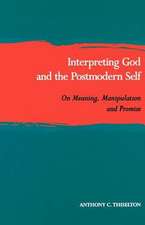Levinas and Theology
Autor Rev'd Nigel Zimmermannen Limba Engleză Paperback – 11 sep 2013
| Toate formatele și edițiile | Preț | Express |
|---|---|---|
| Paperback (1) | 158.64 lei 3-5 săpt. | |
| Bloomsbury Publishing – 11 sep 2013 | 158.64 lei 3-5 săpt. | |
| Hardback (1) | 495.80 lei 6-8 săpt. | |
| Bloomsbury Publishing – 11 sep 2013 | 495.80 lei 6-8 săpt. |
Preț: 158.64 lei
Preț vechi: 172.85 lei
-8% Nou
Puncte Express: 238
Preț estimativ în valută:
30.35€ • 31.69$ • 25.12£
30.35€ • 31.69$ • 25.12£
Carte disponibilă
Livrare economică 15-29 martie
Preluare comenzi: 021 569.72.76
Specificații
ISBN-13: 9780567248671
ISBN-10: 0567248674
Pagini: 216
Dimensiuni: 138 x 216 x 3 mm
Greutate: 0.3 kg
Editura: Bloomsbury Publishing
Colecția T&T Clark
Locul publicării:London, United Kingdom
ISBN-10: 0567248674
Pagini: 216
Dimensiuni: 138 x 216 x 3 mm
Greutate: 0.3 kg
Editura: Bloomsbury Publishing
Colecția T&T Clark
Locul publicării:London, United Kingdom
Caracteristici
Offers
a
digest
of
the
various
ways
that
theologians
have
appropriated
Levinas'
thought
Notă biografică
Nigel
Zimmermannlectures
in
theology
at
the
University
of
Notre
Dame
Australia.
He
completed
his
PhD
at
the
University
of
Edinburgh
and
has
been
a
Wingate
Scholar
since
2011.
His
previous
work
has
appeared
inThe
Heythrop
JournalandThe
Tablet.
Cuprins
Preface
1. Introduction: The Provocation of Levinas
2. Being's Other
3. 'Would you Like to do a Bit of Theology?' Levinas and the Theological Turn
4. The Disturbance of Theology
5. Preferring the Shadows: The 'Little Faith' of Israel
6. The Return of God?
7. Conclusion
Notes
Bibliography
Index
1. Introduction: The Provocation of Levinas
2. Being's Other
3. 'Would you Like to do a Bit of Theology?' Levinas and the Theological Turn
4. The Disturbance of Theology
5. Preferring the Shadows: The 'Little Faith' of Israel
6. The Return of God?
7. Conclusion
Notes
Bibliography
Index
Recenzii
Zimmerman's
book
belongs
in
every
library
that
is
serious
about
keeping
its
theology
and
philosophy
collection
up
to
date.
This study adds significantly to the Philosophy and Theology series. Zimmerman sets Levinas in his historical and contemporary context, critically evaluates his thought and draws out relevant theological themes.
Nigel Zimmermann'sLevinas and Theologyis a book that everyone in the field of Levinas studies, and beyond, must read. Not only does it cover the fundamentals of this great thinker but also, and more pointedly, it points us to what the author calls "the disturbance of theology" and even "the return of God." This is a book that informs, questions, and provokes.
The work of Emmanuel Levinas has proved to be a strong challenge to Christian theological thinking. How should theology deal with the unsettling claim of God's total otherness? How might Levinas' reflections on ethics and religious transcendence help to shape a Christian theology of responsible subjectivity? Zimmermann's book invites readers to engage critically and self-critically with Levinas' thinking and offers them reliable and inspiring guidance during this journey.
This study finds a balanced and nuanced voice somewhere between phenomenology and theology, as much as between Judaism and Christianity ... this book is a wonderful introduction and asset for theologians looking to contemplate the significance of Levinas' work.
This study adds significantly to the Philosophy and Theology series. Zimmerman sets Levinas in his historical and contemporary context, critically evaluates his thought and draws out relevant theological themes.
Nigel Zimmermann'sLevinas and Theologyis a book that everyone in the field of Levinas studies, and beyond, must read. Not only does it cover the fundamentals of this great thinker but also, and more pointedly, it points us to what the author calls "the disturbance of theology" and even "the return of God." This is a book that informs, questions, and provokes.
The work of Emmanuel Levinas has proved to be a strong challenge to Christian theological thinking. How should theology deal with the unsettling claim of God's total otherness? How might Levinas' reflections on ethics and religious transcendence help to shape a Christian theology of responsible subjectivity? Zimmermann's book invites readers to engage critically and self-critically with Levinas' thinking and offers them reliable and inspiring guidance during this journey.
This study finds a balanced and nuanced voice somewhere between phenomenology and theology, as much as between Judaism and Christianity ... this book is a wonderful introduction and asset for theologians looking to contemplate the significance of Levinas' work.















